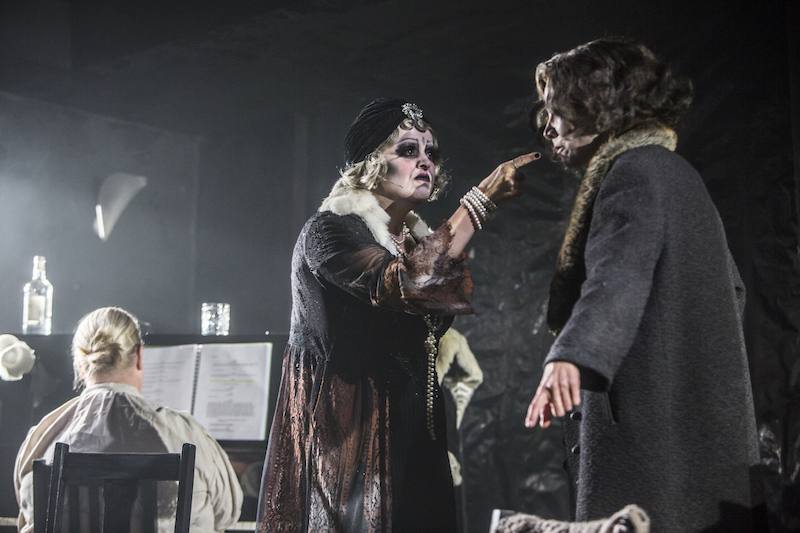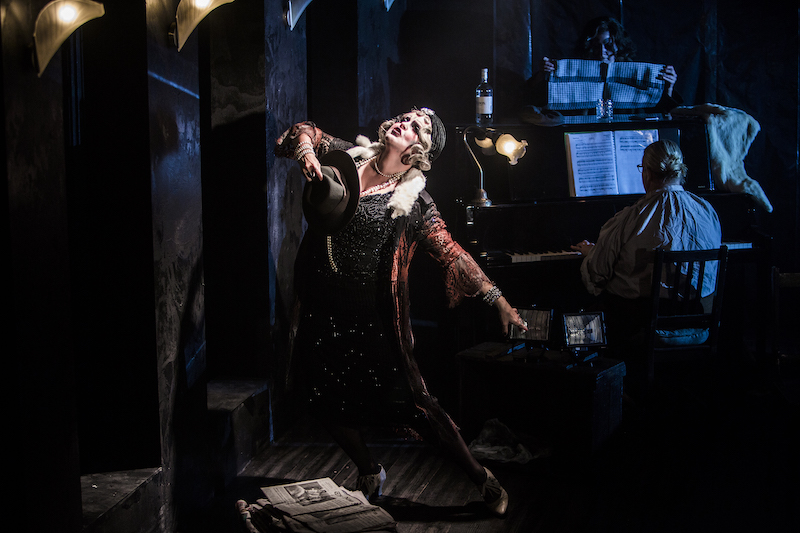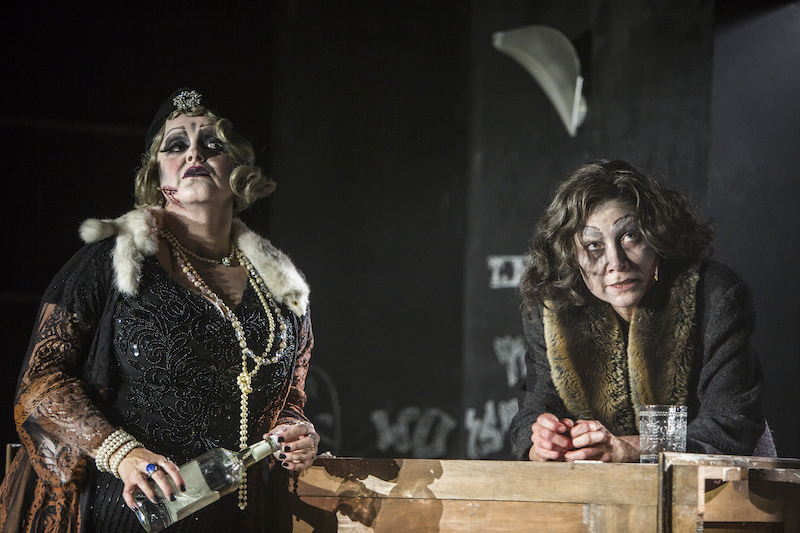Crime queens Tilly Devine and Kate Leigh, who were bitter rivals during the 1920s when their gangs fought it out on the streets of East Sydney in the “razor gang wars”, are a fascinating pair of protagonists for a musical, particularly in the #MeToo era. But Razorhurst, which tells their combined stories, still has a way to go if it is to do more than simply tell us what happened to them.
 Amelia Cormack and Debora Krizak, with Lucy Bermingham on piano in Hayes Theatre Co’s Razorhurst. Photograph © John McRae
Amelia Cormack and Debora Krizak, with Lucy Bermingham on piano in Hayes Theatre Co’s Razorhurst. Photograph © John McRae
The show, with book and lyrics by Kate Mulley and music by Andy Peterson, was inspired by director Benita De Wit, who came across a cartoon of Kate Leigh and sent it to Peterson and Mulley with the comment that it could become the basis for something.
They pitched the idea of a two-hander musical to Cheryl Katz, Artistic Director at Luna Stage in New Jersey, and the show had its premiere in the US in February 2018. It was subsequently rewritten for Australian audiences and now has its Australian premiere at the Hayes Theatre.
Leigh and Devine were certainly tough, entrepreneurial women at a time when men ruled the roost. Leigh was born and raised in Dubbo in a large Roman Catholic family. She moved to Surry Hills where she took advantage of the ban on selling booze in Sydney after 6pm and opened sly grog shops, selling good-quality alcohol and drugs. Devine, who was born in Camberwell in London, arrived in Sydney with her husband after spending her teenage years working as a prostitute. After working the streets in Sydney, she became a madam and opened 30 brothels around Woolloomooloo.
Famous figures in the history of Australian crime, they featured in the television series Underbelly: Razor, while Leigh also inspired a character (Delie Stock) in Sydney Theatre Company’s Harp in the South based on Ruth Park’s books.
 Amelia Cormack in Hayes Theatre Co’s Razorhurst. Photograph © John McRae
Amelia Cormack in Hayes Theatre Co’s Razorhurst. Photograph © John McRae
Razorhurst is set in the present day in one of Leigh’s sly grog shops, now derelict, but recently purchased by Devine’s family who are planning to turn it into a trendy café. A resurrected Devine (Amelia Cormack) appears in elegant 1920s attire. “Not what it used to be. Sydney. East Sydney,” she says. Launching into the song Livin’ in the Good Old Days, she is only half-way through when Leigh (Debora Krizak) bursts into the joint.
Instantly their rivalry flares, with accusations as to which of them was “the worst woman in Sydney”. Leigh looks down on Devine for her whoring, and believes that she herself did good for the community; the unrepentant Devine despises Leigh (who doesn’t drink, having seen what it did to her clients) for her moralising. Frustrated at the way they were both depicted by the press, they tell their respective, intertwined stories which take in murder, faithless husbands, neglected children, and extraordinary bravado, resilience and fortitude, until old age finally catches up with both.
De Wit directs the 90-minute production on a monochromatic set by designer Isabel Hudson, who puts a room on stage that reflects the dark world the pair inhabited, with Musical Director Lucy Bermingham on stage at a piano, where she accompanies the singers. Hudson has also designed authentic looking period costumes (though the make-up verges on pantomime). The production looks great, the device of the women looking back on their lives is effective, and the performances from Krizak and Cormack are terrific but the musical itself never really flies.
The songs generally do little more than tell us about the women and their stories; often what is sung could have been delivered in a couple of lines of dialogue. Instead of being told things by the characters, we need to experience them, to be taken into the thoughts, psychology and emotions of the women through their vocal numbers, to know more about what it took to be such an incredibly tough woman in such a dark, male world. Instead, the shows feels like a biographical cabaret and we are held at one remove emotionally.
 Amelia Cormack and Debora Krizak in Hayes Theatre Co’s Razorhurst. Photograph © John McRae
Amelia Cormack and Debora Krizak in Hayes Theatre Co’s Razorhurst. Photograph © John McRae
Each of the women is given one ballad that takes us into their interior world, but they aren’t the most powerful of songs. Generally, the music draws on the world of 1920s vaudeville and honky-tonk and doesn’t have a great deal of variety. The dialogue could also do with a bit more wit, with much of the humour failing to really ignite.
Krizak and Cormack both deliver the goods, doing all they can with what they are given. Both create vivid characters, which audiences will doubtless enjoy. Cormack also plays Lilian Armfield, Australia’s first female detective, another character into whom it would have been great to get more insight.
Hats off to Mulley and Peterson for tackling a subject that will fascinate Australian audiences, and also to the Hayes for presenting another new Australian musical. It just feels that Razorhurst would have benefited from further development before being staged.
Razorhurst plays at the Hayes Theatre Co, Sydney until July 13











Comments
Log in to join the conversation.